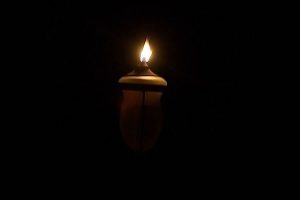O the depths of the riches both of the wisdom and knowledge of God! How unsearchable are his judgment, and his ways past finding out.”
–Romans 11:33
“With buffalo robe draped about his shoulders, the preacher sat on a homemade stool before the fireplace, read the Scriptures, then knelt for prayer. A good Methodist went down on his knees for prayer, cold dirt-floor notwithstanding. After devotions Dyer stepped outside the cabin to check the weather. When he opened the door the rush of cold air left little doubt that the mercury would indicate at least ten or fifteen degrees below zero… Surrounding mountains were but dimly outlined in the darkness while nearer pine and spruce trees stood black, cold and rigidly silent… He would bake a skillet of bread over the coals, fry bacon, boil a pot of coffee. He had stowed a can of peaches in his bed to keep them from freezing during the night… .”
These are some of descriptions from Mark Fiester’s book about the life of John Lewis Dyer. He was sometimes referred to as the “Snow-Shoe Itinerant” preaching upon through the Colorado Rockies. His thought were continually of Heaven and he would often remark, “Look for Me in Heaven,” which is the title of Fiester’s book.
Maybe it is my age, but I look at the course of my life. In fact, yesterday morning at breakfast Annie mentioned, “How did a person who never wanted to be a teacher become one?” I used to jest and would tell students that when I was in college playing baseball I was drafted. I had been talking with Detroit, Kansas City, and Cincinnati and was eventually drafted; however, it was by my “Uncle.” Vietnam was hot and heavy and I knew I would be drafted, so I enlisted in the Air Force.
Who is He that directs the course of our life? Being from Colorado I ended up my time in the military in New York and then, out of a job, moved to Pennsylvania where we lived with Granny and Pappy. My wife and two little girls. Texas? No way; it was too remote, far away and now I have spend over thirty years living here.
Who is it that directs the course of our lives?
———————-
Some things never change; at least the basic concept. Read Exodus 1:15-21. The Pharaoh of Egypt gave the order to kill the Jewish boys at birth. Remember that often in Scripture Egypt is a “type” of the world or sin. The idea here was to destroy a generation of men. The women would then have to intermarry with the Egyptians and the Jews would eventually cease to exist.
My, my look what has been happening for the last few decades in America. Abortions, then alternative lifestyles, the same-sex marriages, and now transgendering. Kill off the generation of men and then eventually the society would have to compromise. Or as C.S. Lewis said, “Castrate the males and then go tell them to propagate.”
This will and can only happen if the church completely compromises. Therefore, it will not happen for God always has a remnant, and prepares a deliverer. In the case of Egypt He prepared Moses; perhaps in the case facing America today, He will send His Son back.
———————-
“You know how you take ten to fifteen minutes every morning reading from the Good Book? I guess you could call this my morning devotions,” he said turning to the side and I watched him draw, holster, draw again.
He looked at me. “You must know how to use the tools given you. Let’s eat breakfast, swing to the west, and head home. I made the coffee, you cook.” (taken from “The True and Unbiased Life of Elias Butler,” written by D.C. Adkisson)
 There is a subtle awareness in the night. The darkness around you does not sleep; it is awake, alert, sensing. It is alive to movement, and feels the changes in the air, the smell, the temperature. The trees are aware, and the bushes. The birds and small animals are aware, and they listen, hesitant, suspecting. Awareness of danger is an element of their being. It is like their breathing, like the blood in their veins, and one who lives much with the wilderness becomes so aware, too. Living with stillness, he detects sounds unheard by the casual passers-by, sees things they do not see, catches odors too faint for their nostrils. Half of woodcraft is attention, and all of survival.”
There is a subtle awareness in the night. The darkness around you does not sleep; it is awake, alert, sensing. It is alive to movement, and feels the changes in the air, the smell, the temperature. The trees are aware, and the bushes. The birds and small animals are aware, and they listen, hesitant, suspecting. Awareness of danger is an element of their being. It is like their breathing, like the blood in their veins, and one who lives much with the wilderness becomes so aware, too. Living with stillness, he detects sounds unheard by the casual passers-by, sees things they do not see, catches odors too faint for their nostrils. Half of woodcraft is attention, and all of survival.”